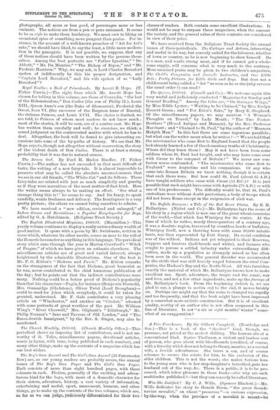The Quiver, 1890 - 91. (Cassell and Co.)—We welcome again this very
useful and judiciously conducted "Magazine for Sunday and General Reading." Among the tales are, "On Stronger Wings," by Miss Edith Lyster ; "Waiting to be Claimed," by Miss Evelyn Everett Green ; and "For Erica's Sake," by Mary E. Shepherd. Of the miscellaneous papers, we may mention "A Woman's Thoughts on Travel," by Lady Meath ; "The Two Foster- Brothers" (Herod Antipa.s and Mennen), by the Rev. Professor Merchant; and "Chained to St. Paul," by the author of "Manners Makyth Man." In this last there are some ingenious parallels ; but what can the writer mean when he writes ?—" We are told that the missionaries who came first to England found that the people had already learned a few of the elementary truths of Christianity. Where did they learn them ? May it not have been from some soldiers whom St. Paul had taught, and who may have come over with Cmar to the conquest of Britain ?" We never saw con- fusion worse confounded. "The missionaries who came first to England" were Augustine and his companions. Of any who came into Roman Britain we know nothing, though it is certain that such there were. But how could St. Paul (about 65 A.D.) have taught soldiers who came with Caaser (55 B.C.) ? It is just possible that such might have come with Agricola (78 A.D.) or with one of his predecessors. The difficulty would be, that St. Paul's custodians were without doubt pra3torians, a body of troops which did not leave Rome except in the exigencies of civil war.






















































 Previous page
Previous page